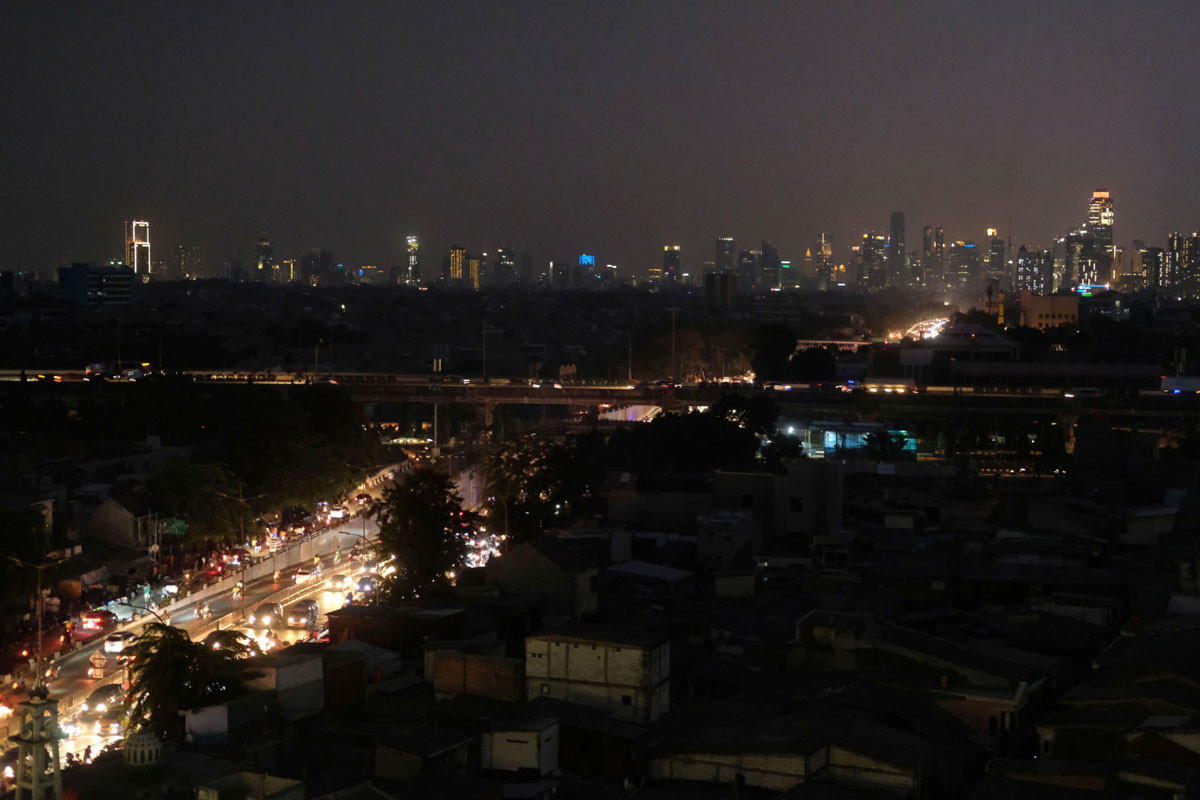Popular Reads
Top Results
Can't find what you're looking for?
View all search resultsPopular Reads
Top Results
Can't find what you're looking for?
View all search resultsNo more blackouts: Jakarta smart city needs smarter grid
The problem of electricity disruption such as a blackout in Jakarta leads to numerous domino effects, including in the digital economy and national security
Change text size
Gift Premium Articles
to Anyone
I
n July, Jakarta Governor Anies Baswedan visited Washington, DC to share his optimism and progress of the capital. He dubbed this development under his administration as the “new face of Jakarta,” where he conveyed his intentions of building an equal, prosperous, modern, dynamic, sustainable and united city.
Anies’s goals for transforming Jakarta into a “city 4.0” where there is dynamic collaboration between city governments and its residents emphasized his vision for a smart city. However, the questions remain unanswered as to whether Jakarta is really ready to become a smart city.
The citywide blackout in August, for instance, illuminates the challenges of Jakarta’s aspirations of becoming a fully functional smart city.
The concept of smart cities encompasses six different categories: smart governance, smart people, smart living, smart mobility, smart economy, and smart environment. The use of technology is pivotal to realize these six different goals.
Without reliable energy, smart cities’ backbone—technology—crumbles.
To become a smart and sustainable city, there needs to be consistent and resilient energy systems. In the case of Jakarta, PLN’s role in supplying reliable electricity to its residents is imperative.
The problem of electricity disruption such as a blackout in Jakarta leads to numerous domino effects, including in the digital economy and national security.
As the capital is rapidly developing its digital economy under its smart city’s initiative, without reliable power, this type of economy will not be achieved. Hence, frequent blackouts in the city could greatly affect Indonesia’s digital economy growth.
The implication of a blackout could lead to economic damage in high-technology economies like Jakarta. The utilization of digital payment systems, banking and e-commerce will be brought to temporary halt and negatively impact the community.
A number of researches, including a report by Allianz, have indicated the economic loss of blackouts. In the US alone, electricity disruption has resulted in the loss of approximately US$104 to $164 billion annually.
Furthermore, when a city experiences frequent blackout, the phenomenon poses profound risk to the country’s national security. Power disruption makes it difficult for governments to monitor extremist channels of communication or potential threats.
A prolonged power outage may also greatly affect critical government facilities in the area, particularly military bases.
Being accustomed to blackouts in Jakarta should not be the new normal in transforming the city to become sustainable and smart. The cost of both national and economic security to this catastrophe should not be overlooked by the government.
If Indonesia is determined to dominate the Southeast Asian digital economy by having a cashless society, the simple solution to this would be to have reliable and consistent electricity. Reforming the management of the state-owned electricity company PLN and introducing smart grid development will lead the country to a right path.
In the short-term, Indonesia must reform its PLN management. The PLN management as we know it has been in shambles for the past years. Graft allegations against the institution’s former president director Sofyan Basir was not the first time PLN’s top echelon led to convictions of corruption. Three other former PLN president directors—Eddie Widiono, Dahlan Iskan and Nur Pamudji—were all found guilty by the Corruption Eradication Commission (KPK).
The top positions within this institution should not be given to political appointees, but rather to career civil servants. The importance of having the right experts with the right skillsets is critical to the institution’s ability to provide excellent service to the community.
The recent blackout also further emphasized Indonesia’s aging infrastructure grid. Therefore, in the long-term, it is important for Indonesia to modernize the country’s electric grid through smart grid enhancements.
Smart grid development is an up-and-coming technology that has been used by numerous countries. The system utilizes digital technology with the ability to sense problems in real time and automatically reroute power to allow continuous flow of electricity when power outage occurs. In short, instead of experiencing blackout, communities would only experience a flicker.
Furthermore, the technology’s ability to introduce two-way dialogue of exchanging electricity and information between consumers and power utilities will boost efficiency, lower power costs for consumers, and lower operating and management costs for utility companies.
The smart grid aptitude in adding resiliency to future emergencies such as earthquakes and blackouts, as well as incorporating greener technology, will help transform Jakarta into a smart and sustainable city. Its automated system to restore electricity quickly after power disturbances will reduce blackout occurrences in the city.
Frequent blackout in Jakarta has multiplier effects on the country’s national and economic security, as well as Jakarta’s development to become a smart city.
To realize the smart city goals, policymakers in Indonesia ought to make smarter decision.
***
Master's graduate in International Development Studies at the George Washington University with specialization in private sector development. Aldwin's capstone project focused on smart cities in Southeast Asia.










